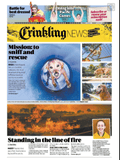Good morning, this is Will Woodward bringing you the main stories and must-reads on Wednesday 8 November.
Top stories
Some of Australia’s leading banks have been revealed as parties to schemes that use tax havens to minimise tax in Australia and other jurisdictions for their wealthy clients, while offering investments in assets such as back catalogues of rock songs. The Paradise Papers reveal that the Commonwealth Bank’s investment banking arm Colonial First State invested US$31m in the FS Media Fund, which was run through an offshore tax haven in Jersey in the English Channel. From 2008 Colonial First State began buying up the rights to music catalogues and soon had assembled a portfolio as diverse as the Trammps’ Disco Inferno, John Denver’s Take Me Home, Country Roads, and the back catalogue of Sheryl Crow. The fund did not incur UK tax liability or US federal tax. But the investment does not appear to have been as lucrative as investors might have hoped, partly because Crow’s back catalogue lost value faster than expected. In a statement Commonwealth Bank said it “does not and will not promote any arrangement or transaction entered into or carried out with the sole or dominant purpose of paying less tax or receiving increased tax offsets and has processes to ensure it is not party to schemes that have a sole or dominant purpose to evade or avoid tax”.
Other revelations from day three of the Paradise Papers include: how Prince Charles invested millions of pounds in offshore funds and companies, including a Bermuda-registered business run by one of his best friends; the offshore cash that helped Steve Bannon mount attacks on Hillary Clinton ahead of the 2016 presidential election; and how a lobby group representing offshore businesses spoke of having “superb penetration” at the highest levels of the British government before a G8 summit that was expected to bring more transparency into the sector. There’s an explainer of the Paradise Papers here and a video here.
Serious questions have been raised concerning Labor members for the first time in the citizenship saga, as Malcolm Turnbull and Bill Shorten prepare to meet to discuss a resolution to the crisis. MP Justine Keay has admitted her renunciation of British citizenship was not effective until after the 2016 election, but she and ALP colleague Susan Lamb are relying on having taken “reasonable steps” to renounce their foreign citizenship. The admission may leave Keay vulnerable to challenge, as several constitutional law experts have warned it is arguable that reasonable steps are not enough to escape the constitutional disqualification on a strict reading of the high court’s decision in the citizenship seven case.
Mining giant BHP has said it will not support the Minerals Council’s bid to strip environmental groups of their ability to advocate for policy change. The Minerals Council has argued that environmental charities should be forced to commit 90% of their resources to on-the-ground environmental remediation, education and research, leaving only 10% for political advocacy. But, our environment reporter Michael Slezak reveals, BHP shareholders and environmental groups have urged the company to take its own line, citing potential reputational damage to the company if it is too closely associated with the Minerals Council’s hardline position on climate change.
The tribunal that allows refugees, veterans and welfare recipients to challenge government decisions has been burdened by a vast increase to its workload. A total of 51,426 matters lodged were lodged with the Administrative Appeals Tribunal in 2016-17, an increase of 24% on the previous year. Among those the tribunal deals with are migrants and refugees who have had a visa denied or cancelled, welfare security recipients who have been issued a debt, and veterans who have been ruled ineligible for support.
The Liberal senator Eric Abetz has rejected the cross-party marriage equality bill drafted by Dean Smith, in a sign a yes vote in the marriage law survey would lead to further government infighting about which bill to use to legislate the reform. Abetz told Guardian Australia the bill – which is co-signed by four Liberal supporters of same-sex marriage and which Labor will support to legislate marriage equality “is seriously inadequate, as parents, freedom of speech and religious freedom, along with conscientious objection, all need full protection”. Conservatives are working on their own same-sex marriage bill, which the assistant minister to the treasurer, Michael Sukkar, has said should include a “no detriment” clause to allow people to reject same-sex marriage in all walks of life. The marriage law survey closed yesterday and the result will be announced next Wednesday.
Sport
A few key moments, from the spin of the new pink ball to the first day-night switch, could decide this week’s unpredictable, historic Women’s Ashes Test match at North Sydney Oval, writes Mel Jones.
What drives a Socceroos fan to travel 14,000km to watch their team play? For some making the journey to San Pedro Sula in Honduras for this week’s crucial World Cup qualifier, the trip is literally a dream come true. Inside the stadium, the Honduran fans bring drums and trumpets. “I don’t know how we’re going to compete,” says Kevin Pollard, a travel booker from Melbourne. “But hopefully the team, knowing there’s 400 Australians there, they’ll feel pretty pumped up.”
Thinking time

Guardian Australia’s Gay Alcorn enjoyed/endured Melbourne Cup day from the racecourse. “Is it a grand Australian good time, whatever your age, your status or your bank balance? To a point. Shoes come off, breasts threaten to pop out of dresses, young people get drunk and give into love and lust. You can dress up in Australia, but this is a casual nation at heart.” Catch up on Kate O’Halloran’s race report as Rekindling brought home a second win for jockey Corey Brown, Chris Cook’s profile of the trainer Joseph O’Brien – at 24 the youngest to win the Melbourne Cup – and the best pictures of the day. The five-year-old horse Regal Monarch was put down after falling in an earlier race on the day.
Greens senator Nick McKim, who was on Manus Island last week as the Australian-run immigration detention centre was closed, has written for the Guardian in response to the prime minister’s claim that McKim and other activists are encouraging 600 men to refuse to leave the centre. “He’s clearly not happy with their decision to defy his government’s efforts to coerce them out by cutting off the essentials of life,” McKim writes. “His untrue and offensive claims are based on the false premise that the detainees do not have agency, and are incapable of making their own decisions. It is the latest insult from a government that has consistently sought to degrade and dehumanise people seeking asylum and refugees.”
What do fossils tell us about South Australia’s past? In an extract from a new book of the year’s best science writing, Alice Gorman describes the Ediacara display in the South Australian Museum. “The ‘elephant skin’ texture – where the hank of a single fern frond was dragged in the storm surge – is visible in the stone, as is the wiggly path or trace fossil of a small worm that escaped burial. In effect, South Australia is the trace fossil of an earlier continent, or an earlier planet – perhaps not even this one. The Ediacara fauna are vastly different to present life on Earth, and may provide an analogue for life elsewhere in the solar system.”
What’s he done now?
Donald Trump has suggested he is open to diplomatic efforts to resolve the standoff with North Korea, urging Pyongyang to come to the table and make a deal in a marked shift from his previous rhetoric. The US president said at a joint press conference with South Korea’s president, Moon Jae-in. “I think we’re making progress … I do see certain movement, yes, but let’s see what happens.”
Media roundup

The Conversation says the Paradise Papers have the “same ring” as last year’s Panama Papers but show “the complexity of the global offshore tax system”, writes Ronan Palen. “The Paradise Papers reveal the goings on of the elites of the offshore world – this time in the supposedly highly regulated havens of the Cayman Islands, Bermuda, Singapore and the like. All places that received a fairly clean bill of health during the OECD peer review process only a few years ago.” In the Australian (paywall), Tony Abbott’s former chief of staff Peta Credlin piles into Malcolm Turnbull over the citizenship saga. “How it got this bad is a potent example of Malcolm Turnbull’s lack of political nous. He might have been a successful businessman but politics is a profession, and judgment, along with temperament, are mandatory requirements.” And the Crinkling News, the weekly newspaper for kids, features Elvis fan Roy Darby, 12, from Ballarat, Victoria. “He’s a really, really cool cat; a great singer, with the best moves. And he made awesome movies too.”
Coming up
Malcolm Turnbull and Bill Shorten are meeting to discuss the government’s planned solution to the citizenship crisis and whether Labor will support it.
Julie Bishop will meet counterparts from Asia and the Pacific at the Apec summit in Vietnam, as regional leaders, including Donald Trump and Jacinda Ardern, begin to arrive. Malcolm Turnbull will attend from Thursday.
Supporting the Guardian
We’d like to acknowledge our generous supporters who enable us to keep reporting on the critical stories. If you value what we do and would like to help, please make a contribution or become a supporter today. Thank you.
Sign up
If you would like to receive the Guardian Australia morning mail to your email inbox every weekday, sign up here.
